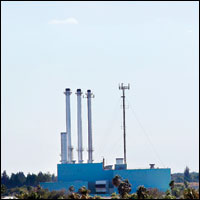 Vero seeks support from Lake Worth for electric sale
Vero seeks support from Lake Worth for electric sale
STORY
The sale of Vero electric to Florida Power and Light took center stage last Tuesday night in Lake Worth, signaling the start of Vero’s public relations campaign to sell the deal to its sister cities.
It made sense for the Lake Worth City Manager Michael Bornstein to invite Vero City Manager Jim O’Connor and Councilwoman Pilar Turner to appear before a joint meeting of the Lake Worth Council and utility advisory board.
The city just south of West Palm Beach faces residential electric rates 28 percent higher than FPL and commercial electric rates 35 percent higher. This has produced a groundswell of popular support for putting the Lake Worth electric utility on the market.
But Lake Worth is also one of the votes Vero needs to untangle itself from its long-term contractual agreements with the Florida Municipal Power Agency.
After a brief introduction by O’Connor, Lake Worth officials questioned him vigorously for about an hour about the process by which Vero opened the door to the sale that is now pending.
They asked how the Vero utility was valued, about the terms of the deal with regard to the FMPA liabilities, and how the city would make up the shortfall created by the loss of the nearly $7 million in transfers from the electric utility into the general fund.
O’Connor did not oversimplify what has been a very complex and arduous exercise. “We’re going through that painful process right now,” O’Connor said of the budget talks and the setting of priorities that has dominated city business this summer.
He explained that on top of the rate disparity, which now sits at about 40 percent for Vero ratepayers, residents want the aging and inefficient power plant off the riverfront. He also discussed why FPL was the natural buyer for the system and how Vero rates would always be compared with FPL due to their bordering territories – a feature Lake Worth shares with Vero.
Going forward, O’Connor told Lake Worth officials that he expects January 1 to mark a critical juncture in the sale because that’s when the negotiating team hopes to have cleared many of the legal and regulatory hurdles.
After O’Connor spoke, Turner offered a more impassioned plea to her counterparts on the Lake Worth council to ally with Vero in its effort to rescue constituents from electric rates that have placed a chokehold on the local economy.
“When our electric rate differential got to over 30 percent and we’re surrounded by the lowest-cost producers, you know, you can understand why you’re going to have outrage, and uproar saying, ‘Hey, you should not be in the electric business. You cannot be competitive,’” Turner said.
Lake Worth officials told Turner and O’Connor they are determined to be competitive with FPL in five years – a promise Vero ratepayers heard many times a few years ago.
The presentation was no secret, but it took place during a several-week summer break from Vero Beach City Council meetings.
About 50 people packed the small council chambers, among them two representatives from FPL there to observe, and utility activist Glenn Heran.
Heran called it "a watershed moment" that Vero city officials were not only invited into a meeting of another FMPA member, but that they got a round of applause and expressions of appreciation after they spoke.
“It’s significant that officials from Vero got to talk to leaders from another city face to face without the interference of the FMPA or the Florida Municipal Electric Association,” Heran said.
“I'm more optimistic about the sale now than I have been in months."








